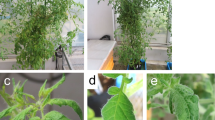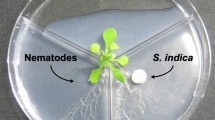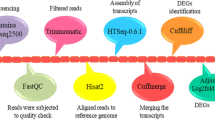Abstract
Meloidogyne incognita is one of the most important plant-parasitic nematodes (PPNs) causing severe crop losses worldwide. Plants have evolved complex defense mechanisms to respond to PPNs attacks. Conversely, PPNs have evolved infection mechanisms that involve the secretion of effector proteins into host plants to suppress immune responses and facilitate parasitism. Therefore, effector genes are attractive targets for the genetic improvement of plant resistance to M. incognita. In this study, we functionally characterized the Minc16803 (Minc3s00746g16803) putative effector gene to evaluate its role during plant-nematode interactions. First, we found that the Minc16803 gene is expressed in all nematode life stages and encodes a protein with an N-terminal signal peptide for secretion, a motif characteristic of effector proteins and with the absence of transmembrane domain. In addition, our data demonstrated that transgenic Arabidopsis thaliana lines overexpressing a Minc16803-dsRNA efficiently downregulated the Minc16803 transcripts in infecting nematodes. Furthermore, transgenic lines were significantly less susceptible to M. incognita compared to wild-type control plants. The number of galls per plant was reduced by up to 84%, while the number of egg masses per plant decreased by up to 93.3%. Moreover, galls and feeding sites in the roots of transgenic lines were smaller than those in the control plants. Histological analysis revealed giant cells without cytoplasm, disordered neighboring cells, and malformed maturing nematodes in transgenic galls. Curiously, numerous hatching ppJ2 juveniles were often observed near the female body within the transgenic root tissues before egg mass extrusion. All findings strongly suggest that Minc16803 gene is a promising target to engineer agricultural crops for M. incognita resistance through host-induced gene silencing.




Similar content being viewed by others
Data availability
The data that support the findings of this study and any material presented in the manuscript are available from the corresponding author upon reasonable request.
References
Ali MA, Azeem F, Li H, Bohlmann H (2017) Smart parasitic nematodes use multifaceted strategies to parasitize plants. Front Plant Sci 8:1–21. https://doi.org/10.3389/fpls.2017.01699
Allen GC, Flores-Vergara MA, Krasynanski S et al (2006) A modified protocol for rapid DNA isolation from plant tissues using cetyltrimethylammonium bromide. Nat Protoc 1:2320–2325. https://doi.org/10.1038/nprot.2006.384
Almagro Armenteros JJ, Tsirigos KD, Sønderby CK et al (2019) SignalP 5.0 improves signal peptide predictions using deep neural networks. Nat Biotechnol 37:420–423. https://doi.org/10.1038/s41587-019-0036-z
Anders S, Pyl PT, Huber W (2015) HTSeq-a python framework to work with high-throughput sequencing data. Bioinformatics 31:166–169. https://doi.org/10.1093/BIOINFORMATICS/BTU638
Basso MF, Lourenço-Tessutti IT, Mendes RAG et al (2020) MiDaf16-like and MiSkn1-like gene families are reliable targets to develop biotechnological tools for the control and management of Meloidogyne incognita. Sci Rep 10:1–13. https://doi.org/10.1038/s41598-020-63968-8
Bauters L, Kyndt T, De Meyer T et al (2020) Chorismate mutase and isochorismatase, two potential effectors of the migratory nematode Hirschmanniella oryzae, increase host susceptibility by manipulating secondary metabolite content of rice. Mol Plant Pathol 21:1634–1646. https://doi.org/10.1111/MPP.13003
Bellafiore S, Shen Z, Rosso MN et al (2008) Direct identification of the Meloidogyne incognita secretome reveals proteins with host cell reprogramming potential. PLoS Pathog 4:e1000192. https://doi.org/10.1371/JOURNAL.PPAT.1000192
Bernard GC, Egnin M, Bonsi C (2017) The impact of plant-parasitic nematodes on agriculture and methods of control. In: Shah MM, Mahamood M (eds) Nematology–Concepts, Diagnosis and Control. InTech. https://doi.org/10.5772/intechopen.68958
Blanc-Mathieu R, Perfus-Barbeoch L, Aury J-M et al (2017) Hybridization and polyploidy enable genomic plasticity without sex in the most devastating plant-parasitic nematodes. PLoS Genet 13:e1006777. https://doi.org/10.1371/journal.pgen.1006777
Blum M, Chang HY, Chuguransky S et al (2021) The InterPro protein families and domains database: 20 years on. Nucleic Acids Res 49:D344–D354. https://doi.org/10.1093/NAR/GKAA977
Bybd DW, Kirkpatrick T, Barker KR (1983) An improved technique for clearing and staining plant tissues for detection of nematodes. J Nematol 15:142–143. https://doi.org/10.1079/9781845930561.0059
Canteri MG, Althaus RA, Filho das JSV et al (2001) SASM-AGRI-Sistema para análise e separação de médias em experimentos agrícolas pelos métodos Scott-knott, Tukey e Duncan. Rev Bras Agrocomputação 1:18–24
Castagnone-Sereno P, Danchin EGJ, Perfus-Barbeoch L, Abad P (2013) Diversity and evolution of Root-Knot nematodes, genus Meloidogyne: new insights from the genomic era. Annu Rev Phytopathol 51:203–220. https://doi.org/10.1146/annurev-phyto-082712-102300
Chaudhary S, Dutta TK, Tyagi N et al (2019) Host-induced silencing of Mi-msp-1 confers resistance to root-knot nematode Meloidogyne incognita in eggplant. Transgenic Res 28:327–340. https://doi.org/10.1007/S11248-019-00126-5/FIGURES/6
Chen J, Lin B, Huang Q et al (2017) A novel Meloidogyne graminicola effector, MgGPP, is secreted into host cells and undergoes glycosylation in concert with proteolysis to suppress plant defenses and promote parasitism. PLoS Pathog 13:e1006301. https://doi.org/10.1371/journal.ppat.1006301
Chen J, Hu L, Sun L et al (2018) A novel Meloidogyne graminicola effector, MgMO237, interacts with multiple host defence-related proteins to manipulate plant basal immunity and promote parasitism. Mol Plant Pathol 19:1942–1955. https://doi.org/10.1111/MPP.12671
Choi I, Subramanian P, Shim D et al (2017) RNA-Seq of plant-parasitic nematode Meloidogyne incognita at various stages of its development. Front Genet 8:190. https://doi.org/10.3389/FGENE.2017.00190/BIBTEX
Chu Y, Guimarães LA, Wu CL et al (2014) A technique to study Meloidogyne arenaria resistance in Agrobacterium rhizogenes-transformed peanut. Research 98:1292–1299. https://doi.org/10.1094/PDIS-12-13-1241-RE
Clough SJ, Bent AF (1998) Floral dip: a simplified method for Agrobacterium-mediated transformation of Arabidopsis thaliana. Plant J 16:735–743. https://doi.org/10.1046/J.1365-313X.1998.00343.X
Coke MC, Mantelin S, Thorpe P, Lilley CJ, Wright KM, Shaw DS, Chande A, Jones JT, Urwin PE (2021) The GpIA7 effector from the potato cyst nematode Globodera pallida targets potato EBP1 and interferes with the plant cell cycle. J Exp Bot 72(20):7301–7315. https://doi.org/10.1093/jxb/erab353
Cunningham F, Allen JE, Allen J et al (2022) Ensembl 2022. Nucleic Acids Res 50:D988–D995. https://doi.org/10.1093/NAR/GKAB1049
Da RM, Bournaud C, Dazenière J et al (2021) Genome expression dynamics reveal the parasitism regulatory landscape of the root-knot nematode Meloidogyne incognita and a promoter motif associated with effector genes. Genes (basel) 12:771. https://doi.org/10.3390/GENES12050771
da Silva EH, da Mattos VS, Furlaneto C et al (2014) Genetic variability and virulence of Meloidogyne incognita populations from Brazil to resistant cotton genotypes. Eur J Plant Pathol 139:195–204. https://doi.org/10.1007/s10658-014-0381-1
Danchin EGJ, Arguel M-J, Campan-Fournier A et al (2013) Identification of novel target genes for safer and more specific control of root-knot nematodes from a pan-genome mining. PLoS Pathog 9:e1003745. https://doi.org/10.1371/journal.ppat.1003745
Diaz-Granados A, Sterken MG, Overmars H et al (2020) The effector GpRbp-1 of Globodera pallida targets a nuclear HECT E3 ubiquitin ligase to modulate gene expression in the host. Mol Plant Pathol 21:66–82. https://doi.org/10.1111/MPP.12880
Dinh PTY, Brown CR, Elling AA (2014) RNA interference of effector gene Mc16D10L confers resistance against Meloidogyne chitwoodi in Arabidopsis and potato. Phytopathology 104:1098–1106. https://doi.org/10.1094/PHYTO-03-14-0063-R
Dutta TK, Papolu PK, Banakar P et al (2015) Tomato transgenic plants expressing hairpin construct of a nematode protease gene conferred enhanced resistance to root-knot nematodes. Front Microbiol 6:260. https://doi.org/10.3389/FMICB.2015.00260
El-Gebali S, Mistry J, Bateman A et al (2019) The Pfam protein families database. Nucleic Acids Res 47:D427–D432. https://doi.org/10.1093/NAR/GKY995
Gardner M, Dhroso A, Johnson N et al (2018) Novel global effector mining from the transcriptome of early life stages of the soybean cyst nematode Heterodera glycines. Sci Rep 8:1–15. https://doi.org/10.1038/s41598-018-20536-5
Grynberg P, Togawa RC, de Freitas LD et al (2020) Comparative genomics reveals novel target genes towards specific control of plant-parasitic nematodes. Genes (basel) 11:1–25. https://doi.org/10.3390/genes11111347
Habash SS, Radakovic ZS, Vankova R et al (2017) Heterodera schachtii tyrosinase-like protein—a novel nematode effector modulating plant hormone homeostasis. Sci Rep 7:1–10. https://doi.org/10.1038/s41598-017-07269-7
Howe KL, Bolt BJ, Shafie M et al (2017) WormBase ParaSite − a comprehensive resource for helminth genomics. Mol Biochem Parasitol 215:2. https://doi.org/10.1016/J.MOLBIOPARA.2016.11.005
Hu Y, You J, Li C et al (2019) The Heterodera glycines effector Hg16B09 is required for nematode parasitism and suppresses plant defense response. Plant Sci 289:110271. https://doi.org/10.1016/J.PLANTSCI.2019.110271
Huang G, Allen R, Davis EL et al (2006) Engineering broad root-knot resistance in transgenic plants by RNAi silencing of a conserved and essential root-knot nematode parasitism gene. Proc Natl Acad Sci U S A 103:14302–14306. https://doi.org/10.1073/pnas.0604698103
Jagdale S, Rao U, Giri AP (2021) Effectors of root-knot nematodes: an arsenal for successful parasitism. Front Plant Sci 12:800030. https://doi.org/10.3389/FPLS.2021.800030
Joshi I, Kumar A, Singh AK et al (2019) Development of nematode resistance in arabidopsis by HD-RNAi-mediated silencing of the effector gene Mi-msp2. Sci Rep 9:17404. https://doi.org/10.1038/s41598-019-53485-8
Joshi I, Kumar A, Kohli D et al (2020) Conferring root-knot nematode resistance via host-delivered RNAi-mediated silencing of four Mi-msp genes in Arabidopsis. Plant Sci 298:110592. https://doi.org/10.1016/j.plantsci.2020.110592
Kim D, Pertea G, Trapnell C et al (2013) TopHat2: accurate alignment of transcriptomes in the presence of insertions, deletions and gene fusions. Genome Biol 14:1–13. https://doi.org/10.1186/GB-2013-14-4-R36/FIGURES/6
Koenning SR, Barker KR, Bowman DT (2001) Resistance as a tactic for management of Meloidogyne incognita on cotton in North Carolina. J Nematol 33:126
Kyndt T, Vieira P, Gheysen G, de Almeida-Engler J (2013) Nematode feeding sites: unique organs in plant roots. Planta 238:807–818. https://doi.org/10.1007/s00425-013-1923-z
Lee RYN, Howe KL, Harris TW et al (2018) WormBase 2017: molting into a new stage. Nucleic Acids Res 46:D869–D874. https://doi.org/10.1093/NAR/GKX998
Leelarasamee N, Zhang L, Gleason C (2018) The root-knot nematode effector MiPFN3 disrupts plant actin filaments and promotes parasitism. PLoS Pathog 14:e1006947. https://doi.org/10.1371/journal.ppat.1006947
Lin B, Zhuo K, Chen S et al (2016) A novel nematode effector suppresses plant immunity by activating host reactive oxygen species-scavenging system. New Phytol 209:1159–1173. https://doi.org/10.1111/nph.13701
Lisei-de-Sá ME, Rodrigues-Silva PL, Morgante CV et al (2021) Pyramiding dsRNAs increases phytonematode tolerance in cotton plants. Planta 254:254–121. https://doi.org/10.1007/S00425-021-03776-0
Lourenço-Tessutti IT, Souza JDA, Martins-de-Sa D et al (2015) Knock-down of heat-shock protein 90 and isocitrate lyase gene expression reduced root-knot nematode reproduction. Phytopathology 105:628–637. https://doi.org/10.1094/PHYTO-09-14-0237-R
Lück S, Kreszies T, Strickert M et al (2019) siRNA-Finder (si-Fi) software for RNAi-target design and off-target prediction. Front Plant Sci 10:1023. https://doi.org/10.3389/fpls.2019.01023
Marchler-Bauer A, Derbyshire MK, Gonzales NR et al (2015) CDD: NCBI’s conserved domain database. Nucleic Acids Res 43:D222–D226. https://doi.org/10.1093/NAR/GKU1221
Mejias J, Truong NM, Abad P et al (2019) Plant proteins and processes targeted by parasitic nematode effectors. Front Plant Sci 10:970. https://doi.org/10.3389/fpls.2019.00970
Mejias J, Bazin J, Truong NM et al (2021) The root-knot nematode effector MiEFF18 interacts with the plant core spliceosomal protein SmD1 required for giant cell formation. New Phytol 229:3408–3423. https://doi.org/10.1111/nph.17089
Mendes RAG, Basso MF, Fernandes J et al (2021a) Minc00344 and Mj-NULG1a effectors interact with GmHub10 protein to promote the soybean parasitism by Meloidogyne incognita and M. javanica. Exp Parasitol 229:108153. https://doi.org/10.1016/j.exppara.2021.108153
Mendes RAG, Basso MF, Paes-de-Melo B et al (2021b) The Mi-EFF1/Minc17998 effector interacts with the soybean GmHub6 protein to promote host plant parasitism by Meloidogyne incognita. Physiol Mol Plant Pathol 114:1–11. https://doi.org/10.1016/j.pmpp.2021.101630
Möller S, Croning MDR, Apweiler R (2001) Evaluation of methods for the prediction of membrane spanning regions. Bioinformatics 17:646–653. https://doi.org/10.1093/BIOINFORMATICS/17.7.646
Moreira VJV, Lourenço-Tessutti IT, Basso MF et al (2022) Minc03328 effector gene downregulation severely affects Meloidogyne incognita parasitism in transgenic Arabidopsis thaliana. Planta 255:1–16. https://doi.org/10.1007/S00425-022-03823-4
Murashige T, Skoog F (1962) A revised medium for rapid growth and bio assays with tobacco tissue cultures. Physiol Plant 15:473–497. https://doi.org/10.1111/j.1399-3054.1962.tb08052.x
Nguyen Ba AN, Pogoutse A, Provart N, Moses AM (2009) NLStradamus: a simple hidden markov model for nuclear localization signal prediction. BMC Bioinform 10:1–11. https://doi.org/10.1186/1471-2105-10-202/FIGURES/7
Niu J, Liu P, Liu Q et al (2016) Msp40 effector of root-knot nematode manipulates plant immunity to facilitate parasitism. Sci Rep 6:1–13. https://doi.org/10.1038/srep19443
Oka Y (2020) From old-generation to next-generation nematicides. Agronomy 10:1387. https://doi.org/10.3390/agronomy10091387
Orfanoudaki G, Markaki M, Chatzi K et al (2017) MatureP: prediction of secreted proteins with exclusive information from their mature regions. Sci Rep 7:3263. https://doi.org/10.1038/s41598-017-03557-4
Pak J, Fire A (2007) Distinct populations of primary and secondary effectors during RNAi in C. elegans. Science 315(5809):241–244. https://doi.org/10.1126/science.1132839
Pfaffl MW (2001) A new mathematical model for relative quantification in real-time RT-PCR. Nucleic Acids Res 29:e45. https://doi.org/10.1093/nar/29.9.e45
Pogorelko G, Juvale PS, Rutter WB et al (2016) A cyst nematode effector binds to diverse plant proteins, increases nematode susceptibility and affects root morphology. Mol Plant Pathol 17:832–844. https://doi.org/10.1111/MPP.12330
Pogorelko G, Wang J, Juvale PS et al (2020) Screening soybean cyst nematode effectors for their ability to suppress plant immunity. Mol Plant Pathol 21:1240–1247. https://doi.org/10.1111/MPP.12972
Qin X, Xue B, Tian H et al (2021) An unconventionally secreted effector from the root knot nematode Meloidogyne incognita, Mi-ISC-1, promotes parasitism by disrupting salicylic acid biosynthesis in host plants. Mol Plant Pathol 00:1–14. https://doi.org/10.1111/MPP.13175
Rutter WB, Hewezi T, Abubucker S et al (2014) Mining novel effector proteins from the eMining novel effector proteins from the esophageal gland cells of Meloidogyne incognita. Mol Plant-Microbe Interact 27:965–974. https://doi.org/10.1094/MPMI-03-14-0076-R
Siddique S, Grundler FM (2018) Parasitic nematodes manipulate plant development to establish feeding sites. Curr Opin Microbiol 46:102–108. https://doi.org/10.1016/j.mib.2018.09.004
Sindhu AS, Maier TR, Mitchum MG et al (2009) Effective and specific in planta RNAi in cyst nematodes: expression interference of four parasitism genes reduces parasitic success. J Exp Bot 60:315–324. https://doi.org/10.1093/jxb/ern289
Smith NA, Singh SP, Wang MB et al (2000) Total silencing by intronspliced hairpin RNAs. Nature 407:319–320. https://doi.org/10.1038/35030305
Song H, Lin B, Huang Q et al (2021) The Meloidogyne javanica effector Mj2G02 interferes with jasmonic acid signalling to suppress cell death and promote parasitism in Arabidopsis. Mol Plant Pathol 22:1288–1301. https://doi.org/10.1111/MPP.13111
Souza Júnior JDA, Coelho RR, Lourenço IT et al (2013) Knocking-down Meloidogyne incognita proteases by plant-delivered dsRNA has negative pleiotropic effect on nematode vigor. PLoS ONE 8:85364. https://doi.org/10.1371/journal.pone.0085364
Steeves RM, Todd TC, Essig JS, Trick HN (2006) Transgenic soybeans expressing siRNAs specific to a major sperm protein gene suppress Heterodera glycines reproduction. Funct Plant Biol 33:991–999. https://doi.org/10.1071/FP06130
Taylor AL, Sasser JN (1978) Biology, identification and control of root-knot nematodes. North Carolina State University Graphics, 111
Tian B, Li J, Vodkin LO et al (2019) Host-derived gene silencing of parasite fitness genes improves resistance to soybean cyst nematodes in stable transgenic soybean. Theor Appl Genet 132:2651–2662. https://doi.org/10.1007/S00122-019-03379-0/FIGURES/7
Triantaphyllou AC, Hirschmann H (1960) Post infection development of Meloidogyne incognita chitwood 1949 (nematoda-heteroderidae). Ann L’institut Phytopathol Benaki 3:1–11
Truong NM, Chen Y, Mejias J et al (2021) The Meloidogyne incognita nuclear effector MiEFF1 interacts with Arabidopsis cytosolic glyceraldehyde-3-phosphate dehydrogenases to promote parasitism. Front Plant Sci 12:641480. https://doi.org/10.3389/fpls.2021.641480
Vandesompele J, De Preter K, Pattyn F et al (2002) Accurate normalization of real-time quantitative RT-PCR data by geometric averaging of multiple internal control genes. Genome Biol 3(7):research0034.1. https://doi.org/10.1186/gb-2002-3-7-research0034
Vens C, Rosso MN, Danchin EGJ (2011) Identifying discriminative classification-based motifs in biological sequences. Bioinformatics 27:1231–1238. https://doi.org/10.1093/BIOINFORMATICS/BTR110
Verma A, Lee C, Morriss S et al (2018) The novel cyst nematode effector protein 30D08 targets host nuclear functions to alter gene expression in feeding sites. New Phytol 219:697–713. https://doi.org/10.1111/NPH.15179
Vieira P, Gleason C (2019) Plant-parasitic nematode effectors — insights into their diversity and new tools for their identification. Curr Opin Plant Biol 50:37–43. https://doi.org/10.1016/j.pbi.2019.02.007
Wang J, Lee C, Replogle A et al (2010) Dual roles for the variable domain in protein trafficking and host-specific recognition of Heterodera glycines CLE effector proteins. New Phytol 187:1003–1017. https://doi.org/10.1111/j.1469-8137.2010.03300.x
Wheeler TA, Siders KT, Anderson MG et al (2014) Management of Meloidogyne incognita with chemicals and cultivars in cotton in a semi-arid environment. J Nematol 46:101
Xie J, Li S, Mo C et al (2016) A novel Meloidogyne incognita effector Misp12 suppresses plant defense response at latter stages of nematode parasitism. Front Plant Sci 7:964. https://doi.org/10.3389/fpls.2016.00964
Zhang J, Coaker G, Zhou JM, Dong X (2020) Plant immune mechanisms: from reductionistic to holistic points of view. Mol Plant 13:1358–1378. https://doi.org/10.1016/J.MOLP.2020.09.007
Zhao J, Li L, Liu Q et al (2019) A MIF-like effector suppresses plant immunity and facilitates nematode parasitism by interacting with plant annexins. J Exp Bot 70:5943–5958. https://doi.org/10.1093/jxb/erz348
Zhao J, Mejias J, Quentin M et al (2020) The root-knot nematode effector MiPDI1 targets a stress-associated protein (SAP) to establish disease in Solanaceae and Arabidopsis. New Phytol 228:1417–1430. https://doi.org/10.1111/nph.16745
Zhou E, Wheeler TA, Starr JL (2000) Root galling and reproduction of Meloidogyne incognita isolates from Texas on resistant cotton genotypes. J Nematol 32:513–518
Zhuo K, Chen J, Lin B et al (2017) A novel Meloidogyne enterolobii effector MeTCTP promotes parasitism by suppressing programmed cell death in host plants. Mol Plant Pathol 18:45–54. https://doi.org/10.1111/MPP.12374
Zhuo K, Naalden D, Nowak S et al (2019) A Meloidogyne graminicola C-type lectin, Mg01965, is secreted into the host apoplast to suppress plant defence and promote parasitism. Mol Plant Pathol 20:346–355. https://doi.org/10.1111/MPP.12759
Acknowledgements
The authors acknowledge EMBRAPA, UCB, CNPq, CAPES, INCT PlantStress Biotech, and FAPDF for the scientific and financial support.
Funding
This work was supported by grants from INCT PlantStress Biotech, EMBRAPA, CNPq, CAPES, and FAPDF. MFB is grateful to CNPq for a postdoctoral research fellowship (PDJ 150936/2018-4). ITLT is grateful to CAPES/Cofecub project Sv.922/18 for financial support in the researcher and students exchange program between institutions.
Author information
Authors and Affiliations
Corresponding author
Ethics declarations
Conflict of interest
The authors declare no conflict of interest.
Additional information
Communicated by Aurelio Ciancio.
Publisher's Note
Springer Nature remains neutral with regard to jurisdictional claims in published maps and institutional affiliations.
Supplementary Information
Below is the link to the electronic supplementary material.
Rights and permissions
Springer Nature or its licensor (e.g. a society or other partner) holds exclusive rights to this article under a publishing agreement with the author(s) or other rightsholder(s); author self-archiving of the accepted manuscript version of this article is solely governed by the terms of such publishing agreement and applicable law.
About this article
Cite this article
Moreira, V.J.V., Pinheiro, D.H., Lourenço-Tessutti, I.T. et al. In planta RNAi targeting Meloidogyne incognita Minc16803 gene perturbs nematode parasitism and reduces plant susceptibility. J Pest Sci 97, 411–427 (2024). https://doi.org/10.1007/s10340-023-01623-7
Received:
Revised:
Accepted:
Published:
Issue Date:
DOI: https://doi.org/10.1007/s10340-023-01623-7




